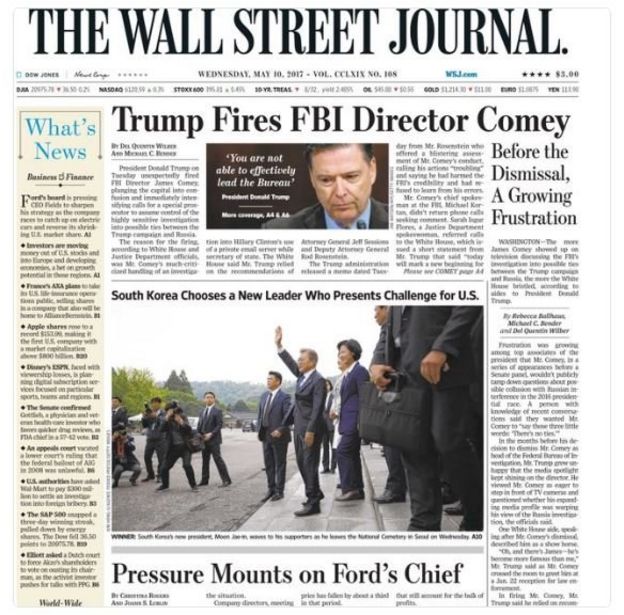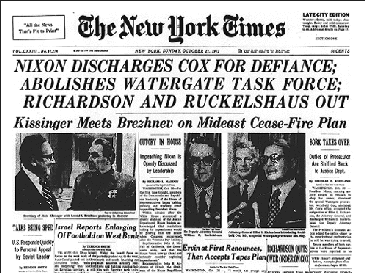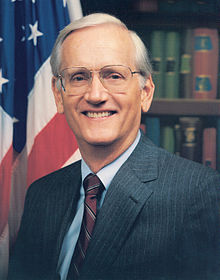Presidents and Pink Slips
President Donald Trump's bombshell firing of FBI Director James Comey is leaving oversized craters in the political environment. It's not unusual for incoming presidents to fire or ask for the resignations of bureaucrats left over from the previous administration, but Comey's firing has politicians, the press, and politically-tuned-in citizens on edge.
The unease is due to the FBI's investigation of President Trump and his associates and their possible ties to Russia. Firing the director leading that investigation is leaving a host of commentators crying foul.
 |
| President Donald Trump and former FBI Director James Comey. Rex/Shutterstock |
David Ignatius of the Washington Post wrote:
"Comey’s firing takes the country closer to the dangerous collision that has been looming since allegations began about possible connections between Trump and his associates and the Russian covert influence operation Comey has been investigating since July."The Los Angeles Times editorialized:
"Frankly, the Comey firing is deeply troubling. . . . You can be critical of some of Comey’s actions in connection with the Clinton email investigation and still be alarmed by the way he has been removed."The San Jose Mercury News opined:
"James Comey has few fans among either Republicans or Democrats in Congress. But when a president fires an FBI director who is investigating him and his people, it raises alarms. When the investigation is examining possible ties to a foreign power said to have influenced an election in his favor — the alarms are deafening."
 |
| News of James Comey's firing from the Wall Street Journal, May 10, 2017. |
Not all have sounded the alarm bells. The Wall Street Journal praised the firing:
"The Federal Bureau of Investigation Director has committed more than enough mistakes in the last year to be dismissed for cause. . . . He has dangled insinuations across his career about the George W. Bush White House and surveillance, then Mrs. Clinton and emails, and now Mr. Trump and Russia. He is political in precisely the way we don't want a leader of America's premier law-enforcement agency to behave."But the most damning of editorials came from the New York Times. Its editorial board wrote:
"Mr. Comey was fired because he was leading an active investigation that could bring down a president. . . . The president of the United States, who is no more above the law than any other citizen, has now decisively crippled the F.B.I.’s ability to carry out an investigation of him and his associates. . . .
Now, there is no special prosecutor in place to determine whether the public trust has been violated, and whether the presidency was effectively stolen by a hostile foreign power. For that reason, the country has reached an even more perilous moment."The most obvious historical comparison is President Richard Nixon's firing of Special Prosecutor Archibald Cox, who was investigating the break-in of the Democratic National Committee offices in the Watergate Hotel.
 |
| Special Prosecutor Archibald Cox. |
Cox had issued a subpoena to President Nixon to hand over his tape-recorded conversations, which Nixon refused to do. Nixon instead offered a compromise: he would hand over summaries of the tapes. Now it was Cox's turn to refuse.
The next day, Nixon ordered Attorney General Elliot Richardson to fire Cox. Richardson refused and resigned in protest. Nixon then ordered Deputy Attorney General William Ruckelhaus to fire Cox, but Ruckelhaus, too, refused and resigned. Finally, Nixon got his wish when acting head of the Justice Department Robert Bork agreed to fire the special prosecutor. The "Saturday Night Massacre" went down in infamy and hastened the exit for President Nixon.
 |
| News of the "Saturday Night Massacre" from the New York Times, October 21, 1973. |
The Massacre is the most parallel American historical event to Trump's firing of Comey, but presidents have previously been in the news for high-profile firings:
- President Barack Obama demanded the resignation of General Stanley McChrystal in 2010 after McChrystal gave a Rolling Stone interview that was critical of the president's Afghanistan policy. "I was selling an unsellable position," McChrystal said.
 |
| President Barack Obama (left) and General Stanley McChrystal. |
- President Bill Clinton fired FBI Director William Sessions in 1993 when Sessions refused to resign amid accusations that he used government resources for himself and his family. He also avoided paying taxes on the use of his FBI limousine. "We cannot have a leadership vacuum at an agency as important to the United States as the FBI," Clinton said.
 |
| FBI Director William Sessions |
- President Harry Truman fired General Douglas MacArthur in 1951 when MacArthur told diplomats that he would succeed in expanding the Korean War into a greater war on Communist China, which was against Truman's policy. Truman later said, "I fired him because he wouldn't respect the authority of the President. I didn't fire him because he was a dumb son of a bitch, although he was, but that's not against the law for generals. If it was, half to three-quarters of them would be in jail."
 |
| President Harry Truman (left) and General Douglas MacArthur on Wake Island in 1950. |
- President Abraham Lincoln fired General George McClellan in 1862 when McClellan had refused time and again to move his army into action against the Confederates. In a letter to McClellan, Lincoln stated, "My dear McClellan: If you don’t want to use the Army I should like to borrow it for a while."
| President Abraham Lincoln (left) and General George McClellan after the Battle of Antietam in 1862. |
Will President Trump's firing of James Comey make it on the list? What will become of the FBI's pending investigation of Trump and his associates?
I am currently working on a book about Ah Toy, the first Chinese brothel madam in gold rush San Francisco.
Want to read more? Click "Subscribe." Please feel free to share this post and your comments.
I am learning so much from your blog posts! Thank you. I especially enjoyed reading about Presidents Truman and Lincoln. I feel like the American political scene was more "say it like you mean it" back in the day...
ReplyDeleteThank you! Past presidents sure got to the point, didn't they?
Delete